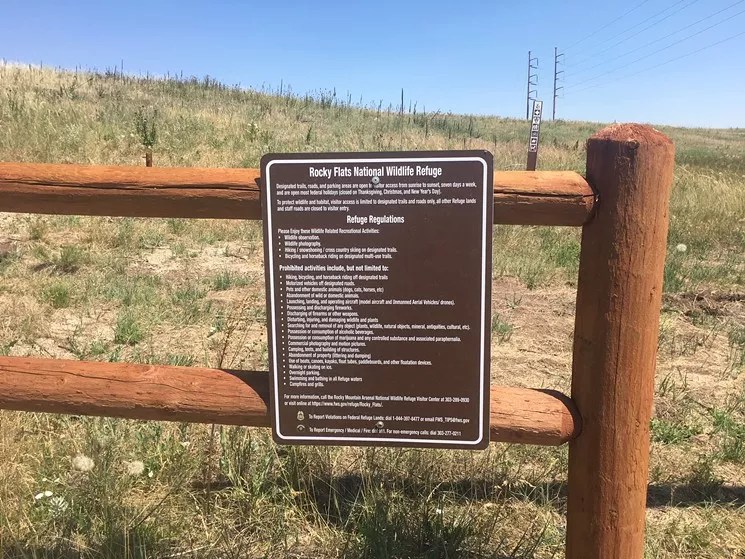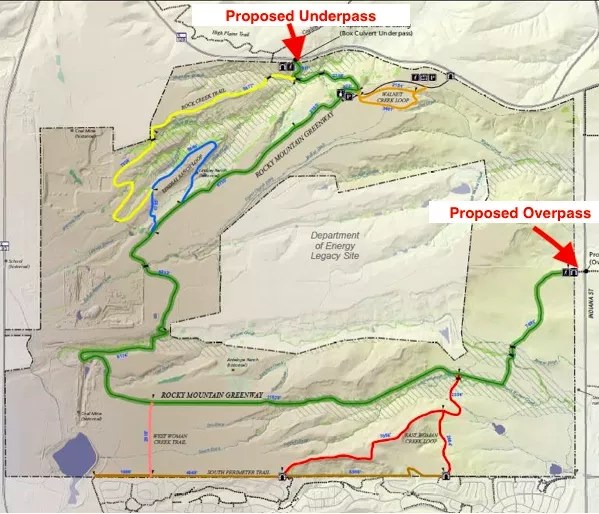
Patricia Calhoun

Audio By Carbonatix
If activists had anything to say about it, the Boulder City Council would have withdrawn from the Rocky Mountain Greenway Project during its April 13 meeting. But activists didn’t get a say in the matter, at least not then. The latest decision on the project was presented as an update, not a discussion item, because as Carl Castillo, the city’s chief policy advisor, explained, “The one thing we don’t want…is for this to become a public hearing item.”
That quote comes from an email that the Rocky Mountain Peace and Justice Center, a longtime human and environmental rights organization based in Boulder, obtained through a records request. A thread of emails among city employees discussing if and how they should allow the public to speak at the April 13 meeting culminates with that comment from Castillo.
When the meeting finally did take place, community members were not given a chance to speak – and councilmembers directed city staffers to move ahead with the latest plans for the Rocky Mountain Greenway. A week earlier, on April 6, Boulder County had approved the Greenway project at another meeting that did not accept spoken public testimony; instead, residents had been asked to email their comments, and only a select few of those emails were read aloud.
The lack of an open discussion before these votes sits poorly with many Boulder residents, particularly those who believe the Greenway project is a safety hazard that puts community members at a greater risk for developing cancer.
“We are currently working to get to the bottom of what led our Boulder governments to shut out the public in this way,” says Giselle Herzfeld, a RMPJC staff member. “The emails we have found so far lead us to believe that there is more at play than what is currently known by the public.”
The Rocky Mountain Greenway Project, which is already partially built, will connect existing trails and build new ones to create a continuous path from the Rocky Mountain Arsenal National Wildlife Refuge in Commerce City past Rocky Flats to Boulder and, eventually, even farther north to Rocky Mountain National Park. Over the past six months, the governments involved – including the City of Boulder, Boulder County, Arvada, Westminster and Jefferson County – have been asked to approve funding for a relatively small portion of the overall project: an underpass beneath State Highway 128 and an overpass above Indiana Street.

Map courtesy of the Boulder City Council; annotations added
Small as the two connections may seem, when a proposal to approve them came before Broomfield – which was once a sixth partner in the project – last October, that city opted not to fund the connections and took the opportunity to withdraw from the project altogether.
Broomfield’s resolution to withdraw stated that the city was motivated by safety concerns about the portion of the trail network on the Rocky Flats National Wildlife Refuge. The refuge is on land that was formerly the site of the Rocky Flats Nuclear Weapons Plant, which manufactured plutonium triggers for bombs. The plant was raided by the federal government in 1989 during an investigation looking into allegations of criminal environmental violations at the plant, including accidents that contaminated the soil with radioactive waste.
Rocky Flats underwent a cleanup that concluded ahead of schedule in the mid-2000s, and the Environmental Protection Agency and Colorado Department of Public Health and Environment have both deemed most of the area safe for use as a wildlife refuge. Future construction by the site, including new trails for the Greenway project and a potential toll road called the Jefferson Parkway, also got the green light from CDPHE.
The agency made that call after a 2019 soil study showed high levels of plutonium in one sample taken from the east side of Rocky Flats, just south of where the Indiana overpass will be built. The standard established during the cleanup calls for no more than 50 pCi/g of plutonium; this single sample was much higher, at 264 pCi/g.
Trails already exist at Rocky Flats, but they are isolated from the rest of the Greenway, with SH 128 and Indiana effectively acting as barriers. The future underpass and overpass would offer cyclists an alternative to crossing busy highways to get to the Rocky Flats trails – promoting safety, project planners say.
But they would also make it that much easier for cyclists to get to the trails on the Rocky Flats National Wildlife Refuge, which is one of the reasons that Broomfield withdrew from the project. RMPJC members and other advocates for public health hoped that more Greenway partners might follow suit, but Jeffco, Westminster and Arvada joined Boulder in approving the latest piece of the project.
In Boulder, only County Commissioner Matt Jones did not support the proposal – all other commissioners and councilmembers asked staffers to move ahead with it, citing the CDPHE’s determination that the project is safe, among other factors.
“People are on it [the Rocky Flats trails], so for me, it’s a question of do they get there safely or not,” Commissioner Clair Levy said during the Boulder County meeting. “I think it will make access safer, and I think a lot of work has gone into it.”
As for the decision to only take written comments at that meeting, the county commissioners’ chief of staff, Michelle Krezek, points out that the public has had four years’ worth of meetings and open houses to weigh in on the Greenway project. The idea of applying for a grant to build the connections was first presented to Boulder officials in 2016.
“There is always a balance between giving the public the opportunity to offer input on the issue being discussed, efficiently conducting the business of the county and providing the public with meaningful opportunities to affect the requested action being taken by the commissioners,” Krezek says. “Our usual practice for an IGA [Intergovernmental Agreement] like this…would have been to consider this at a business meeting where no public testimony is taken. However, because of the public interest, I felt like a good compromise was to move this IGA to a separate meeting and allow written public testimony.”
Boulder’s next steps will be to draft an agreement related to the maintenance of the future underpass at SH 128 and plan the route that the Greenway will take north of there.
Meanwhile, the RMPJC has started planning some next steps of its own, to hold Boulder officials “accountable and call out the injustice of their decision,” Herzfeld says.
That first step was made on April 22, when attorney Randall Weiner sent a letter on behalf of Physicians for Social Responsibility and the Rocky Flats Technical Group to the Boulder City Council and City Attorney Tom Carr, urging the City of Boulder to reconsider its decision to support the Greenway. “City staff should not sign the IGA, expend monies on its behalf, or otherwise facilitate the project without a City Council hearing or study session,” the letter concluded, giving Boulder until May 3 to respond.
Read the full letter here:
This story was updated at 4 p.m. April 22 to include the letter to the Boulder City Attorney.